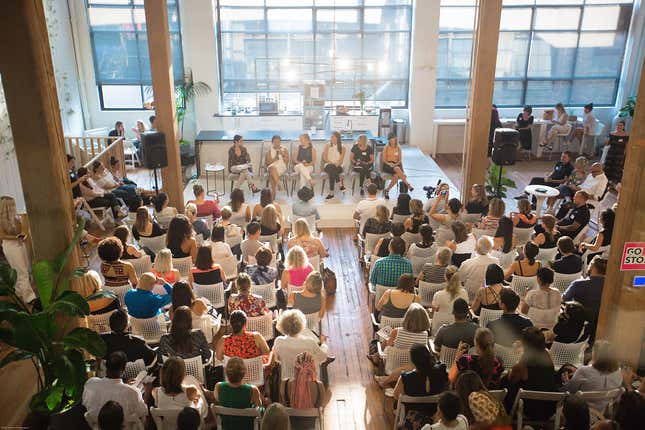The Nineteenth Amendment. The Civil Rights Act of 1964. Title IX. People directly affected by these laws didn’t get them passed on their own—they had to convince others who didn’t look like them (usually white men) that giving them more power would make things better for everyone.
Amy Nelson thinks about that a lot. She’s the creator of The Riveter, a female-driven company that has erected a slew of coworking spaces in five US cities and plans to open in another four soon. She knows that “it’s not a perfect comparison” to equate powerful, game-changing legislation with what she does, but there are certainly some elements that are similar. Because unlike other companies that are part of a growing trend of female-only coworking spaces, The Riveter isn’t only for women. “We are very explicit that all genders are welcome in these spaces,” Nelson says. “That in itself is interesting—it’s not controversial, but it’s also not well understood. It means The Riveter is built by women, and we welcome all genders.”
In practice, that means creating events and programming that help women better navigate their careers, but that offer skills that are also useful for men, who make up about 30% of The Riveter’s members. “The hurdles that remain in the business world are different for women than they are for men,” Nelson says. For example, women are less likely to get promoted than their male colleagues, so Nelson’s team might book a talk about how to ask for a raise, which could be useful for both men and women. “The tactics we’re teaching women aren’t single-gendered—we know this isn’t just a problem for women, but statistics show us [that it will help women more],” she says. They also have some programming specifically for men intended to help them increase the inclusivity in their companies.

Nelson also has rules for communication at The Riveter designed to keep conversation open and civil. When she worked as a lawyer, Nelson says men would sometimes talk over her in meetings or repeat an idea she had just put forth. She makes it a policy now to call out those men, to make them aware of their behavior and how it affects others in the workplace. “It might embarrass him the first time it happens,” Nelson says. “We all get embarrassed at work. I think we have to accept that and embrace that as part of the learning process.”
There are other rules. One is a 24-hour conflict rule: If you have a disagreement with someone, you address it within a day instead of letting it fester. Another: You assume best intentions. “We’re an early-stage startup, and everyone is moving a million miles an hour. If you get an email from me that’s short or curt, assume the best intentions—that everyone is really busy,” Nelson says. These elements aren’t built around gender, she notes, but they are an important way Nelson defines The Riveter’s open and transparent culture. That transparency comes with other benefits—Nelson takes the time to talk to men specifically about how they see the world and how they, together, can change it.
Nelson believes these practices can make things better for women—and, yes, for men—everywhere. “I’m constantly thinking about how we get men involved in issues around gender equity. I believe nothing will change for women until this is something everyone works on,” Nelson says.
This story is part of How We’ll Win in 2019, a year-long exploration of the fight for gender equality. Read more stories here.
